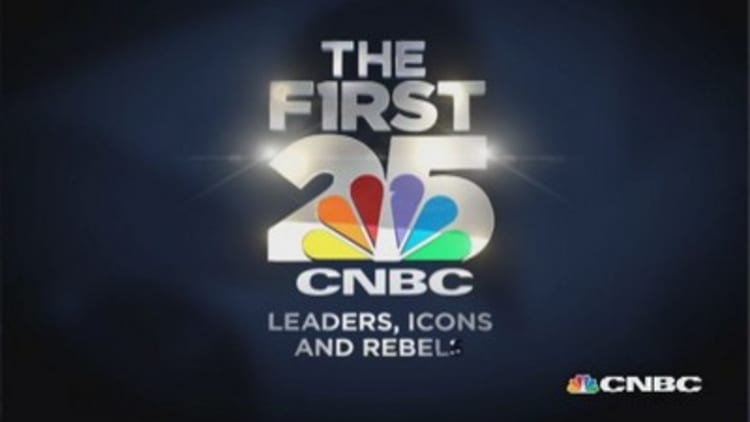The beauty, and the beast, of putting together a list like CNBC's First 25 is that you go into the process knowing that no one will be happy when you come out of it. That's because the final product is so totally, exquisitely, infuriatingly … debatable. You just can't win.
Your spouse criticizes you: "How could you possibly bury Martha Stewart at Number 24? She's top 12 for sure." Colleagues you've known for years call you idiotic: "Martha Stewart? Seriously? She's not even top 500!"
Jobs at No. 1 and Gates at No. 2? Or should it be the other way around? After all, there hardly would have been a personal computer revolution without Gates. Yes, you say, but if he hadn't propagated an operating system, somebody else would have. True, but Gates did it. And even if IBM handed him the ball, he didn't fumble. He built the dominant productivity software of the past quarter-century, Microsoft Office; the paramount browser, Explorer; incubated the world's top travel website, Expedia; and hatched Xbox.

OK, you say, but he just wasn't cool. Cool? Well, that was Jobs. He made elegant products consumers love, and he may have been the best retailer since Sam Walton. (And, hey, while we're at it, what about Walton? Where's he on your damn list? The answer to that one is easy. We excluded him because he died in 1992 and most of his empire-building predated CNBC's 25-year history.)
But let's talk about Jobs for a minute. The Apple OS never had more than a few points of market share on the desktop and laptop. Jobs didn't put the smart in smartphones. Mike Lazaridis of BlackBerry did. And the iPod wasn't the first portable music player.Sony's Walkman was, and it had a radio. Philanthropy? Jobs didn't come close to Gates. Fair enough, but he could rock a turtleneck—as well as everything from PCs, to music and movies, to smartphones—with style.
You get the point. Everyone on our First 25, and every ranking in it, can be argued for and against. And that, folks, is the point. A ranking like this one is meant to spur discussion as well as celebrate exceptional achievement. And, let me tell you, the debates among the members of our advisory panel were every bit as heated as those sure to take place now that the list has been published.
We all swore to keep our deliberations secret. But if I get another email from Jeff Sonnenfeld, senior associate dean at the Yale School of Management, arguing for (oops, I'd better not say), I'm going to leave my entire worldly estate to Harvard.
We made the decision early on to eliminate heads of government and state from our deliberations. This is a list, after all, about business people, not politicians. It's about the men and women who, for better or worse, have had the most transformative effect on commerce, finance, markets, human behavior and global culture over the past 25 years. So out went Bill Clinton, Angela Merkel, Jiang Zemin, Hu Jintao, Lee Kuan Yew and Vladimir Putin. In came Oprah.
This not a list of billionaires, though many of the people on it are. Money is not the measure. Revolutionary, or evolutionary, impact is. Hence the third-richest man in the world, Amancio Ortega, founder of the Zara retailing empire and the father of fast fashion, comes in at No. 19. That's six places above the world's second-richest person, Carlos Slim. No knock on Slim. We just judged Ortega's global impact to be greater.
To be clear: The CNBC First 25 concerns judgment—CNBC's judgment, augmented by our advisory board, based on our coverage of business, markets and world events over the past quarter-century. This was not a popularity contest. Yes, we gave strong consideration to the votes and suggestions of CNBC's audience. But it was never intended as a business version of "The Voice" or "American Idol."
The list is heavy on technology. And why not? Hasn't the major story of the past quarter-century been the changes wrought by technology? That surely doesn't mean that every tech titan made the First 25. Michael Dell didn't (a painful late cut for several of us). Neither did South Korea's richest man, Lee Kun-Hee of Samsung, despite swatting aside Sony and needling Apple.
You could argue that Sir Tim Berners-Lee, father of the World Wide Web (sorry Al Gore), deserves not only to be in the top 25—as several of our number did—but to be No. 1, as the Gutenberg of our era. In the end, our collective judgment was that Berners-Lee was less a business leader than a computer scientist who transformed how we share information. He put a singular mark on history, but others, such as the Google trio of Larry Page, Sergey Brin and Eric Schmidt—collectively No. 4 on our list—Jeff Bezos (No. 5) and Mark Zuckerberg (No. 8) built the Internet economy that Berners-Lee made possible.
Making choices in the world of finance brought some of the advisory board's toughest decisions. Michael Bloomberg made the cut at No. 20. Before he became a politician, he was a titan of finance, a techie and a media guy—affecting three of the defining business trends of the CNBC era. His beautiful box, the Bloomberg terminal, revolutionized trading and markets.
Henry Paulson, a former Goldman Sachs CEO and Treasury secretary, was an immensely worthy contender. He led Goldman, long the whitest of white-shoe Wall Street partnerships, into the modern era as a publicly traded company. As Treasury secretary, he was the Bush administration's point person during the financial crisis of 2008. For that, some consider him a hero, right alongside former Fed Chairman Ben Bernanke. But critics argue that he (and Bernanke, for that matter) was slow to publicly acknowledge the seriousness of the crisis. Moreover, his tenure at Treasury, while full of tumult and consequence, was a comparatively brief 30 months.
Jamie Dimon of JPMorgan Chase, Charles Schwab, Ned and Abigail Johnson of Fidelity, Laurence Fink of BlackRock and Hugh McColl, the man who broke the barriers to interstate banking and put Charlotte, N.C., on the map as home to more than NASCAR—could easily have been on our final list. As could have Steven Schwartzman of Blackstone and Henry Kravis of KKR, two stunning grandmasters of private equity.
But we deliberately put ourselves into a straitjacket with just 25 names (and could have filled it just with financiers). We knew we would be forced to make hard calls. Ultimately, we decided that along with Bloomberg, Jack Bogle, Carl Icahn and Sandy Weill not only had proved to be financial wizards over the past quarter-century but had most changed Wall Street.
While we're on the subject of financial wizardry, what about Michael Milken? He invented some of the financing tools and many of the tactics that made possible the likes of Schwartzman, Kravis and Icahn. If not for junk bonds, Ted Turner would not have been Ted Turner and Rupert Murdoch would not have been Murdoch. I confess I pushed for Milken until I became a nuisance. I lost. The panel decided that he was basically an '80s dude, his greatest innovation and influence predating CNBC's 1989 launch.
Which leads me back to my original point: With a list like this one, you just can't win. Oh, yeah—I voted against Martha, too, until I voted for her.









